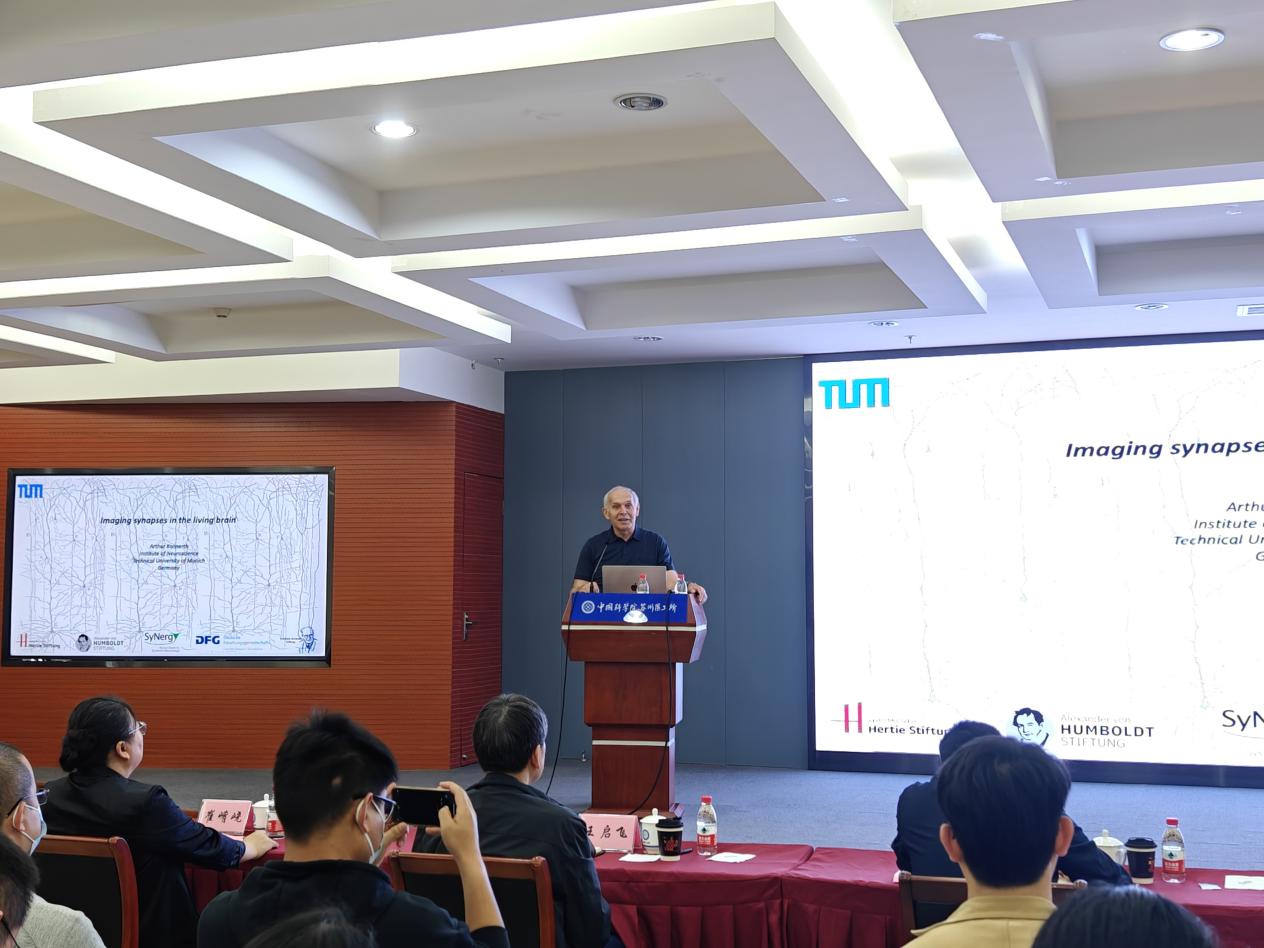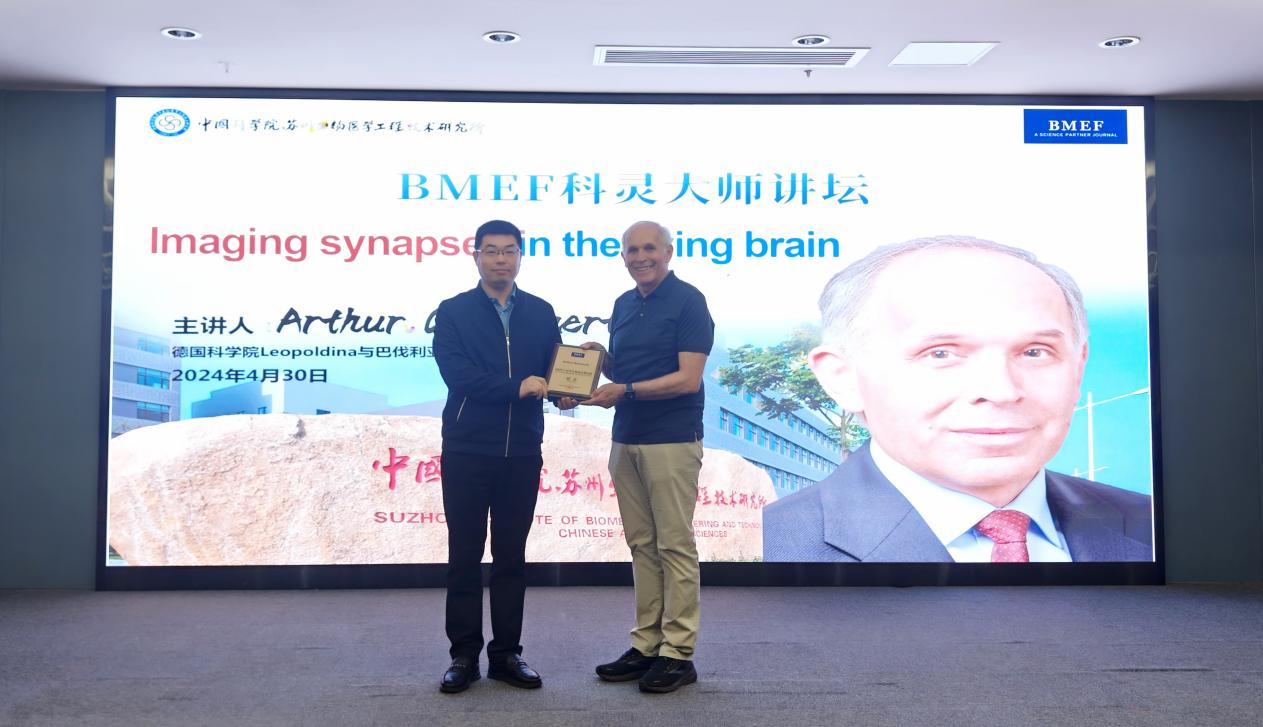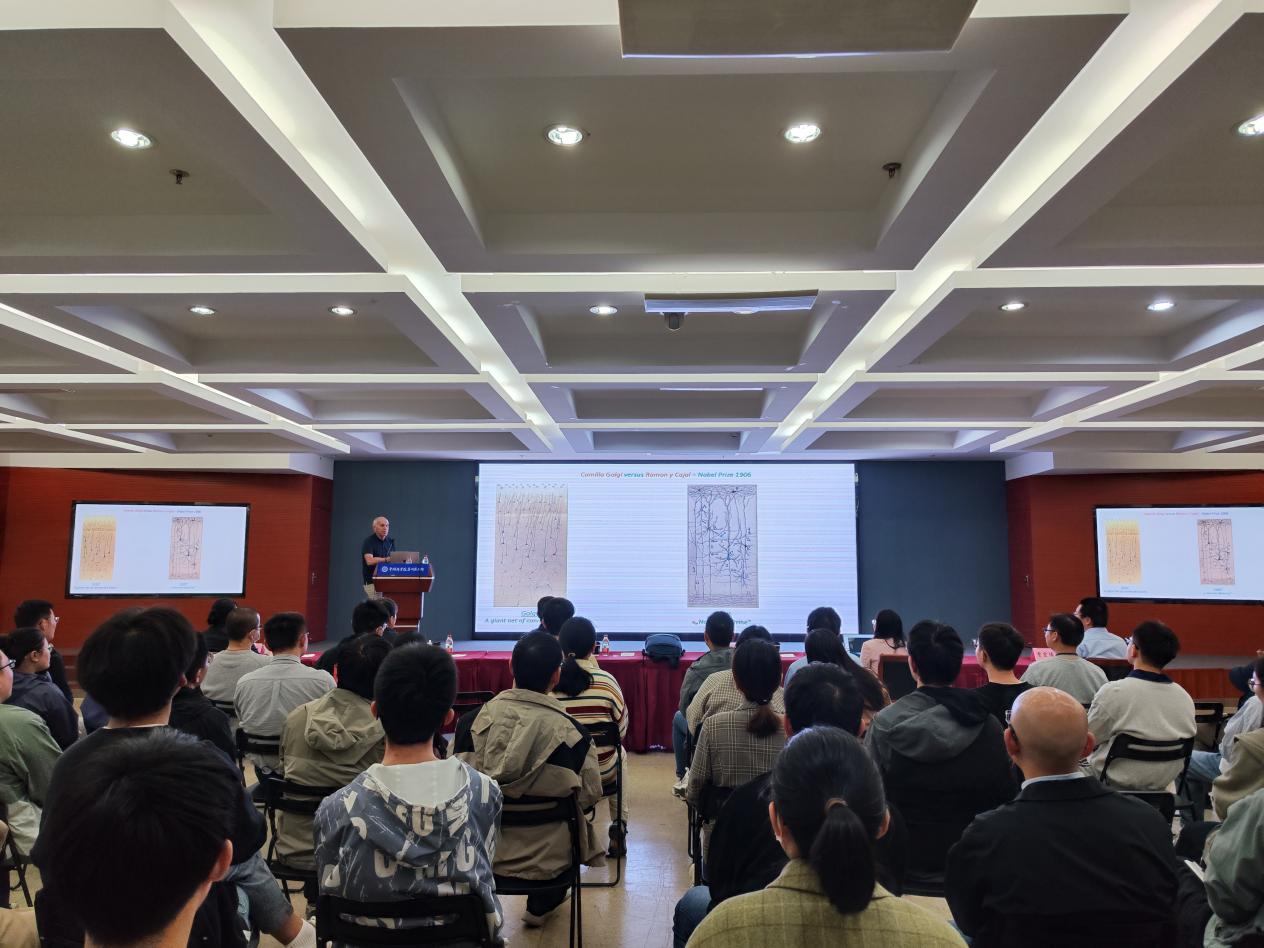At the prestigious "BioMedical Engineering Frontiers" (abbreviated as "BMEF") academic forum held on April 30th Professor Arthur Konnerth, academia leopoldnina, gave a talk at the 4th BMEF keling top scientists forum. Meanwhile, professor Han Yunyun,professor from Huazhong University of Science and Technology (HUST) gave a talk at the 2nd BMEF keling academic forum.
Organized by the Suzhou Institute of Biomedical Engineering and Technology (SIBET) of the Chinese Academy of Sciences (CAS), the forum attracted 200 attendees, from universities, research institutes and companies.
Prof. Konnerth gave a lecture titled " Imaging synapses in the living brain". He introduced the early history of neuroscience a century ago when Santiago Ramon y Caja drew the first microscopic pictures of neuronal synapses. He then introduced the recent decades' development of visualizing live functional activities of single synapses of mammalian brains and highlighted the significant contributions pioneered by his lab. He then presented the most up-to-date cutting-edge imaging method and data on real-time detection of single synaptic glutamate transmission in the visual cortex and identified the fundamental mechanism of orientation selectivity which is an elementary feature of visual cognition an information processing. Prof. Konnerth's work highly represents how precise imaging devices can help advance key frontiers of neuroscience and beyond.
Prof. Han Yunyun lectured on "Cortical Neural Networks: Basics of Info Partitioning & Transformation," addressing the cortex's makeup, single-cell function groups, connectivity, and sensory info handling. She underscored consistent cortical linkages, cognition discrepancies between species, cognitive-state-dependent cortical dynamics, and the roles of dACC, RSP, and A1 in sensory interaction. Prof. Han concluded with a primary sensory cortex info partitioning network model, adaptable for cognitive tasks, aiming to clarify how cortical networks finely tune cross-region collaboration for complex info processing.
At the forum, Prof. Konnerth and Prof. Han had an interactive Q&A session with the attendees.
After the forum, Prof. Wu Chengtie, director of SIBET presented a commemorative certificate to Prof. Konnerth, while Prof. Wang Qifei, deputy director of SIBET awarded a memorial certificate to Prof. Han.
To lead the scientific and technological development in the field of biomedical engineering and gather high-quality innovative resources, SIBET founded the international high-level academic journal "BioMedical Engineering Frontiers" in 2018.
SIBET focuses on cutting-edge science and technology in biomedical engineering, strengthening the cross-integration of biomedical and engineering, and promoting academic exchanges and cooperation.
The "BMEF Academic Forum" series started in Jan 2024, established by SIBET, including: "BMEF Keling Top Scientists Forum" and "BMEF Keling Academic Forum". Committed to creating an academic forum with international impact.
"Innovating biomedical engineering for the betterment of human life and health," SIBET is dedicated to elevating the "BMEF Academic Forum" into a globally recognized intellectual platform, fueling the rapid development towards a world-class institution. This aims to propel advancements at the forefront of science and technology, thereby underpinning the attainment of "four premier statuses: Leading in tech and science progress, nurturing innovation talent, creating top research think tanks, and building elite institutes globally" and the strategic objectives of "accelerated innovation, accelerated growth, and concerted efforts," thereby solidifying our commitment to excellence.
Professor Arthur G. Konnerth, Academia Leopoldnina, is an internationally renowned expert in neurophysiology and recipient of Germany's highest scientific honor, the Leibniz Prize, as well as the Brain Prize, the pinnacle international award in brain research. During the 1980s and 1990s, he developed and applied the patch-clamp whole-cell recording technique on fresh brain slices, establishing it as a pivotal tool for quantitative neurophysiological measurements. Over the past two decades, Professor Konnerth has dedicated himself to the advancement and application of high-resolution in vivo functional microscopic imaging techniques, particularly two-photon imaging. Following his pioneering role in the evolution of calcium-sensitive two-photon in vivo imaging methods, which earned him the Brain Prize, he has lately been at the forefront of adopting glutamate-sensitive probes. These allow for the precise detection of individual neurotransmitter release events at single synapses within the living brain, marking him as a leading figure in contemporary, quantifiable neuroscience.
Professor Han Yunyun from Huazhong University of Science and Technology is a distinguished young overseas high-caliber talent. Her principal research endeavors encompass: Developing and employing whole-brain imaging techniques and connectome-based quantitative analyses to elucidate the principles governing information routing in neural networks. Leveraging in vivo calcium imaging in small animals to investigate the dynamic transformations within cortical neural networks during complex cognitive tasks, learning, and execution, thereby unraveling the mechanisms underlying information processing and decision-making in these networks.
Professor Han's research accomplishments are manifested in multiple publications as lead and corresponding author in esteemed journals such as Nature, Neuron, and Nature Neuroscience.

Prof. Kenneth reported

Issue commemorative certificate

Forum photos